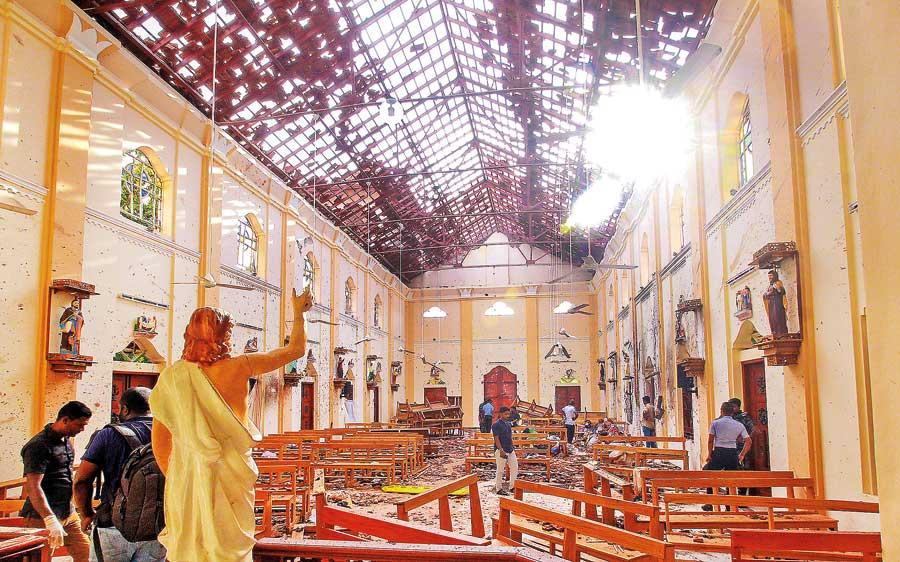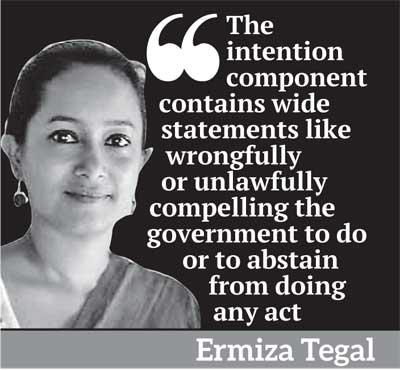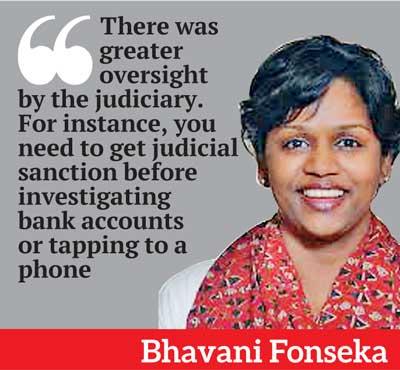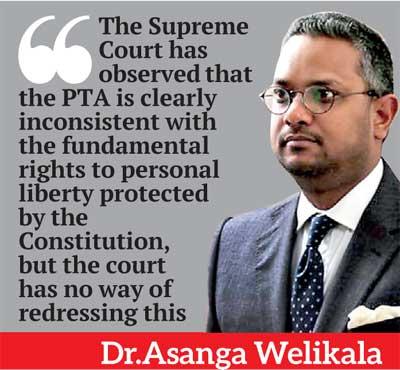Reply To:
Name - Reply Comment

- Any counter terror law introduced should be in compliance with the Constitution
- Draft CTA prone to abuse
- Not the time to be drafting laws
- CTA is an improvement to the PTA
 lobal Terrorism has led to violence, blood shed, trauma and uncertainty in people’s lives the world over. In Sri Lanka terrorists wreaked havoc when nine suicide bombers blew themselves off killing more than 250 and injuring more than 500 in their wake. Against this backdrop the sufficiency of existing laws to combat international terrorism has been questioned and there is now a rising discourse on the draft Counter Terrorism Act(CTA). Different views have been aired; that had the Counter Terrorism Bill been enacted the Easter Sunday Attacks would have been averted; that this draft Act would curtail dissent and freedom of expression; that the purpose of the legislation which is to counter terrorism will not be achieved as terrorists will be treated with “utmost leniency” etc. In this article, the Daily Mirror explores legal perspectives on the positives in the draft Counter Terrorism Act and the areas which are of concern.
lobal Terrorism has led to violence, blood shed, trauma and uncertainty in people’s lives the world over. In Sri Lanka terrorists wreaked havoc when nine suicide bombers blew themselves off killing more than 250 and injuring more than 500 in their wake. Against this backdrop the sufficiency of existing laws to combat international terrorism has been questioned and there is now a rising discourse on the draft Counter Terrorism Act(CTA). Different views have been aired; that had the Counter Terrorism Bill been enacted the Easter Sunday Attacks would have been averted; that this draft Act would curtail dissent and freedom of expression; that the purpose of the legislation which is to counter terrorism will not be achieved as terrorists will be treated with “utmost leniency” etc. In this article, the Daily Mirror explores legal perspectives on the positives in the draft Counter Terrorism Act and the areas which are of concern.
While the existing legal framework as found in the Prevention of Terrorism Act, Penal Code, the International Covenant on Civil and Political Rights Act 2007, Suppression of Terrorist Bombings Act 1999 and the UN sanctions against IS deal with global terrorism related offenses including arresting those who joined foreign terror groups and returned to Sri Lanka, experts opine that a new legislation would make it easier to combat and monitor international terror activities. However, any counter terror law introduced should be in compliance with the Constitution, meet international standards and have the necessary safeguards to prevent abuse.
The daft CTA is hoped to repeal the Prevention of Terrorism (Temporary Provisions) Act, No. 48 of 1979(PTA). The need for the repeal of the PTA and for new counter terror laws in line with international standards and requirements was felt much before the Easter Sunday Terror attacks. The PTA was enacted in 1978 as a temporary measure, but was made permanent in 1982. The PTA was a domestic response to the situation existing at the time of its enactment, and lawyers emphasise on the need for more updated laws to counter the threat of global terrorism.
Further, the PTA has been criticised over and over again for being violative of the fundamental rights contained in the Constitution and for being draconian. It has been misused to target  human rights activists, journalists and politicians. The PTA has facilitated torture, prolonged detention without charge or trial, and allows confessions, obtained under duress, to be used against accused.
human rights activists, journalists and politicians. The PTA has facilitated torture, prolonged detention without charge or trial, and allows confessions, obtained under duress, to be used against accused.
“The Supreme Court has observed that the PTA is clearly inconsistent with the fundamental rights to personal liberty protected by the Constitution, but the court has no way of redressing this given that the Constitution does not permit it to strike down unconstitutional laws,” said Dr.Asanga Welikala, a lecturer in public law and the Director of the Edinburgh Center for Constitutional Law.
The draft Counter-Terrorism Act (CTA) was approved by the Cabinet on 11 September 2018 and it was tabled in Parliament on 9 October 2018. The CTA includes new terror threats taking into account the problem of global terrorism.
The draft CTA is hoped to prevent terrorism committed within or outside Sri Lanka and to prevent using Sri Lankan territory and its people for terrorism outside Sri Lank. Further, the draft Act provides for the identification, apprehension, arrest, custody, detention, investigation, prosecution and punishment of any person who has committed an act of terrorism or any other offence associated with terrorism.
The draft CTA uses a two-pronged test to define terrorism. Accordingly, there should be an intention and an action. This creates a broad definition for terrorism in comparison to the scope covered by the PTA.
Accordingly, a person has committed the offence of terrorism if he has the intention of
(a) intimidating a population;
(b) wrongfully or unlawfully compelling the government of Sri Lanka, or any other government, or an international organization, to do or to abstain from doing any act;
(c) preventing any such government from functioning; or
(d) causing harm to the territorial integrity or sovereignty of Sri Lanka or any other sovereign country.
And commits an “act” such as,
murder, attempted murder, grievous hurt, hostage taking or abduction of any person;
(b) endangering the life of any person other than the person committing the act;
(c) causing serious damage to property, including public or private property, any place of public use, a State or Governmental facility, any public or private transportation system or any infrastructure facility or environment;
(d) causing serious obstruction or damage to essential services or supplies;
(e) committing the offence of robbery, extortion or theft, in respect of State or private property;
(f) causing serious risk to the health and safety of the public or a section thereof;
(g) causing obstruction or damage to, or interference with, any electronic or automated or computerized system or network or cyber environment of domains assigned to, or websites registered with such domains assigned to Sri Lanka;
(h) causing obstruction or damage to, or interference with any critical infrastructure or logistic facility associated with any essential service or supply;
(i) causing destruction or damage to religious or cultural property or heritage; and
(j) causing obstruction or damage to, or interference with any electronic, analog, digital or other wire-linked or wireless transmission system including signal transmission and any other frequency based transmission system.
Attorney-at-Law Ermiza Tegal pointed out that this definition is overly broad. “The intention component contains wide statements like wrongfully or unlawfully compelling the government to do or to abstain from doing any act. For example, if you were to hold a protest and you were protesting that the Government should or should not do something and damage public property, you can be arrested under the CTA which does not have the protections afforded by the ordinary criminal justice system,” she said. “Any kind of dissenting voice can be targeted when the law is used in a politically advantageous way,” she added.
However, a Human Rights Lawyer who did not want to be named said that Section 2(2) and Section 3(3) prevent an act which does not fall under the definition of terrorism to be an offence under the CTA.
According to Section 2(2) the CTA cannot be enforced against a person who commits an offense other than an offence within the meaning of the Act, despite the complexity, aggravated nature or seriousness of the consequences of such offence. Section 3(3) exempts actions of a person taken in good faith in the lawful exercise of a fundamental right.

Attorney-at-Law Bhavani Fonseka said the draft CTA looked at more updated terror threats. “It has power to look at digital communications. Many developments have taken place since the PTA was introduced. CTA factors in current issues, potential threats than any existing law,” she said.
According to Dr. Welikala many provisions in the CTA makes for a better balance between the powers needed by the state to protect the community from terrorism, and the constitutionally required standards of protection for individual liberty. “It is better than the PTA in terms of: the permissibility, duration, and conditions of detention; oversight of arrest and detention by the courts and the Human Rights Commission; the ingredients of criminal liability for terrorism-related offences; fair trial rights including access to legal advice by suspects; and the overall scope for judicial supervision over the exercise of powers under the Act,” he said.
Fonseka added that there was greater oversight by the judiciary. “For instance, you need to get judicial sanction before investigating bank accounts or tapping to a phone,” she explained.
The Human Rights Lawyer who did not want to be named pointed out that while the PTA had only one or two sections dealing with investigation powers, the CTA contains a wide array of investigation powers. Speaking about safeguards against the violation of fundamental rights of those arrested under the CTA, he pointed out that the CTA provides for the mandatory setting up of a counter terrorism unit.
“Confessions made to the police are not admissible because in the past there were many allegations of forced confessions obtained by torture. This incentivises you to do a more scientific investigation because when a confession is forced, the actual offender can be out there,” he said.
“To avoid enforced disappearances, the CTA provides that the reason for the arrest must be stated and that the family must be informed. The Human Rights Commission must be informed. There should be a database which documents all the arrests. The period of detention order has been reduced as detention orders are very often abused. After the first two weeks you have to satisfy the magistrate to extend the order for a valid reason, and not as a matter of routine. Magistrate has some discretion unlike before. There is an administrative review body to look into whether detention orders are being issued for valid purposes. The magistrate can have a private interview with the arrestee and if the magistrate suspects torture he can order a medical examination,” he added.
 He further pointed out that under the PTA a person aggrieved under the Act could only appeal to the Supreme Court. But under the CTA an aggrieved person can appeal to the Court of Appeal as well.
He further pointed out that under the PTA a person aggrieved under the Act could only appeal to the Supreme Court. But under the CTA an aggrieved person can appeal to the Court of Appeal as well.
However, this is concerning as many are unable to access these courts because of the lack of resources, possible reprisals in the absence of a proper witness protection system and other challenges, Tegal said. “You can’t really successfully challenge your awrbitrary arrest or detention. It limits the kinds of people who can challenge. The vulnerable groups such as the poor and the minorities will be left unable to challenge the detention,” she added.
She pointed out it was problematic that the magistrate does not have the power to oversee whether the arrest was made under reasonable grounds or suspicion. “That is a huge component of criminal law, separation of power and rule of law. So the CTA suspends basic protection to those arrested by the police,” she said.
She pointed out that the CTA does not take into account the human rights violations that took place under the PTA and the emergency regulations. “It does not take into account the arbitrary arrests, the arbitrary detentions, the longterm detentions, the individuals who were compelled to accept the charge and take rehabilitation as a way of securing their release within a year or two as a result of uncertainty as to whether cases will conclude within a short period of time,” she said.
“The fundamental rights cost was not taken into account when the CTA was drafted. Many provisions in the CTA allow the same kind of human rights violation,” she added.
Dr. Welikala said: “Areas of concern include the arrest and detention powers granted to the military and the coast guard; the powers of issuing detention orders and how they are reviewed; powers given to the police to issue directives for the protection of the public that will endanger civil liberties; and the powers of the minister to issue restriction and proscription orders, which is prone to abuse by a government that is unmindful of, or indeed hostile to, the competing concerns of fundamental freedoms in relation to public order.”
Lawyers point out that the draft should be further improved to make it more consistent with constitutional rights and international standards governing anti-terrorism powers. The draft as it stands today is prone to abuse, said Fonseka. “The safeguards must be strengthened. There can be greater oversight given to the judiciary. We have suggested an oversight mechanism with independent experts. In countries like the UK, Canada and Australia, they have independent experts looking at the implementation of the Act and they suggest improvements and monitor whether torture is still being used,”
Experts also stressed on the need for Parliament oversight- a factor which the CTA has not taken into account. “The CTA will be much improved by providing for closer parliamentary oversight. Ensuring that Parliament – representing the whole Sri Lankan community in its diversity – has a role in holding the executive to account for the exercise of counter-terrorism powers is crucially important in the post-Easter Sunday context,” said Dr. Welikala. 
Tegal who stressed that the CTA does not afford basic protection to those arrested under it said that any counter terrorism law introduced should afford basic protection and be proportionate and specific to the threat faced. “If you want to make it illegal for foreign fighters to enter Si Lanka, that is a very specific thing and if it is a threat to Sri Lanka, that can be made an offense,” she said, adding that Sri Lanka does not need ‘this version of the counter terrorism act.”
Meanwhile, Fonseka pointed out that legal reform should be carried when there is space for debate and for improvement. “At the moment Sri Lanka is in a situation where there is fear and paranoia. That’s not the time to be drafting laws because that fear psychosis paranoia can influence law reform,” she stressed.
She also pointed out that apart from reforming and introducing new laws, the criminal justice system should be reformed and training should be given to police officers. “Attitudes need to change,” she said. Dr.Weikala said that improving the text of laws is just one aspect of dealing with the challenge of terrorism. “Having better drafted laws will only go so far in correcting the much more serious issues of culture of governance – these cannot right the wrongs of political negligence and incompetence at the highest levels, for example, or the pervasive culture of brutality that characterises our methods of law enforcement – although they will help,” Dr.Welikala stressed.